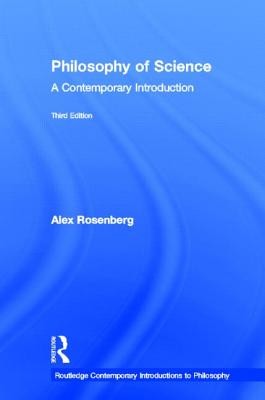
- We will send in 10–14 business days.
- Author: Alex Rosenberg
- Publisher: Routledge
- ISBN-10: 0415891760
- ISBN-13: 9780415891769
- Format: 15.5 x 23.6 x 2.3 cm, hardcover
- Language: English
- SAVE -10% with code: EXTRA
Reviews
Description
Any serious student attempting to better understand the nature, methods and justification of science will value Alex Rosenberg's updated and substantially revised Third Edition of Philosophy of Science: A Contemporary Introduction. Weaving together lucid explanations and clear analyses, the volume is a much-used, thematically oriented introduction to the field.
New features of the Third Edition include more coverage of the history of the philosophy of science, more fully developed material on the metaphysics of causal and physical necessity, more background on the contrast between empiricism and rationalism in science, and new material on the structure of theoretical science (with expanded coverage of Newtonian and Darwinian theories and models) and the realism/antirealism controversy. Rosenberg also divides the Third Edition into fifteen chapters, aligning each chapter with a week in a standard semester-long course. Updated Discussion Questions, Glossary, Bibliography and Suggested Readings lists at the end of each chapter will make the Third Edition indispensable, either as a comprehensive stand-alone text or alongside the many wide-ranging collections of articles and book excerpts currently available.
Read our interview with Alex Rosenberg, What exactly is philosophy of science - and why does it matter? here: www.routledge.com/u/alexrosenberg
EXTRA 10 % discount with code: EXTRA
The promotion ends in 20d.11:29:17
The discount code is valid when purchasing from 10 €. Discounts do not stack.
- Author: Alex Rosenberg
- Publisher: Routledge
- ISBN-10: 0415891760
- ISBN-13: 9780415891769
- Format: 15.5 x 23.6 x 2.3 cm, hardcover
- Language: English English
Any serious student attempting to better understand the nature, methods and justification of science will value Alex Rosenberg's updated and substantially revised Third Edition of Philosophy of Science: A Contemporary Introduction. Weaving together lucid explanations and clear analyses, the volume is a much-used, thematically oriented introduction to the field.
New features of the Third Edition include more coverage of the history of the philosophy of science, more fully developed material on the metaphysics of causal and physical necessity, more background on the contrast between empiricism and rationalism in science, and new material on the structure of theoretical science (with expanded coverage of Newtonian and Darwinian theories and models) and the realism/antirealism controversy. Rosenberg also divides the Third Edition into fifteen chapters, aligning each chapter with a week in a standard semester-long course. Updated Discussion Questions, Glossary, Bibliography and Suggested Readings lists at the end of each chapter will make the Third Edition indispensable, either as a comprehensive stand-alone text or alongside the many wide-ranging collections of articles and book excerpts currently available.
Read our interview with Alex Rosenberg, What exactly is philosophy of science - and why does it matter? here: www.routledge.com/u/alexrosenberg


Reviews